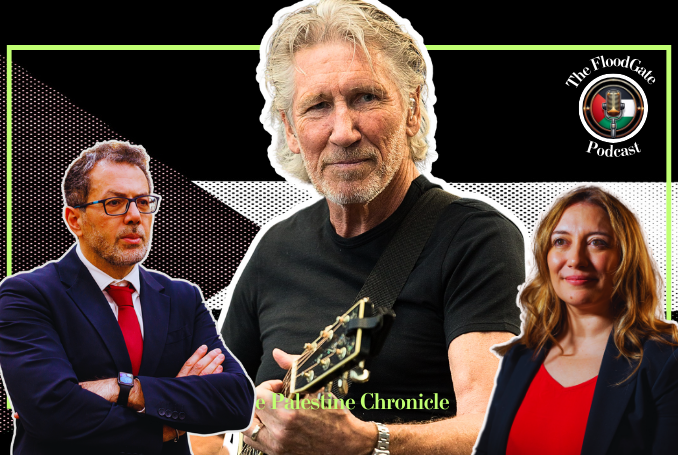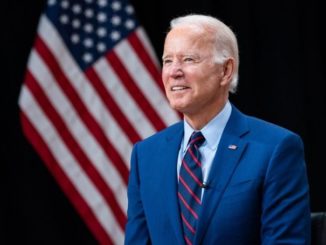
By Romana Rubeo 
Roger Waters joins the FloodGate podcast for an unflinching conversation on Gaza, genocide, and the global fight for justice.
In this compelling episode of the Palestine Chronicle’s FloodGate podcast, we were joined by iconic musician and activist Roger Waters for an unfiltered and thought-provoking conversation on Gaza, genocide, and global resistance.
The discussion, which I conducted along with Ramzy Baroud, challenges dominant mainstream narratives, offering a powerful blend of moral clarity, political insight, and urgent calls to action.
Here are seven key takeaways from the conversation.
1. Critique of International Law & Statelessness
The conversation began with a piercing look at how statelessness undermines human rights, a theme Baroud introduced conceptually:
“Because Palestinians are stateless, they automatically seem to lose every political privilege they are supposedly granted under human rights conventions, including the Geneva Conventions.”
Waters responded with biting clarity: “It’s very—this is a complex issue, dealing as it does with the niceties of international law… As we know, the Palestinians don’t (have a state – PC). Last year, on April 18th, there was a draft resolution before the Security Council to finally welcome Palestine as a full member of the United Nations. That was vetoed, inevitably, by the United States.”
He traced this failure to its origins: “It was all agreed in Yalta, Stalin and Roosevelt and Churchill all agreed, well, yeah, we’ll have a new United… it’s something to replace the League of Nations, but we are not going to lose control of it, so we’ll have this thing called the Security Council… But we will all have a veto on it so that we can control it completely.”
“That’s why it’s completely dysfunctional,” he concluded. “If we did adopt the universal declaration of human rights and enshrined it in international law, enforceable by the ICJ or the ICC or somebody, that would be the end of war forever, everywhere.”
2. Condemnation of Genocide & Western Complicity
Waters’ condemnation of Israel’s genocide in Gaza was unrelenting.
“The United States and the UK and Israel are wrong. We are right. Genocide is wrong. It’s so self-evidently obvious. Murdering babies with 2,000-pound bombs is wrong,” he declared.
Waters also said that it is wrong to kill political leaders and detailed some of the Israeli atrocities: “Nasrallah’s deputy in Lebanon a few months ago—whenever it was—they dropped 62,000-pound bombs on a residential high-rise building because they knew he was somewhere in there. So they dropped 62,000 to kill one man.”
Baroud tied this to Western support: “The bombs that were dropped on Nasrallah—and dropped on Gaza over the course of 15 months—they were issued by the Biden administration… Here we are. The genocide is starting all over again in Gaza. And this time, it is funded, sustained, defended, and supported by the Trump administration.”
Waters questioned any faith in Washington and the Western world. “They pretend that they care about human rights when we know they don’t give a f*** about human rights. Because their actions speak louder than their words.”
“When we—or people who were representing our countries at the time—signed up to the Universal Declaration of Human Rights, we had our fingers crossed behind our backs. We didn’t mean any of it. Ever. At any point.”
3. Resistance & Solidarity Movements
Waters celebrated Palestinian resistance and the global solidarity movement as acts of courage.
“There’s that Holocaust survivor in London. He’s 87 years old. He’s going every single Saturday and marching in the street, and he’s just been arrested by the Nazi police in London,” he said.
He also mentioned Mahmoud Khalil, the young Columbia graduate who was recently detained and threatened with deportation due to his pro-Palestine activism.
“They’re now trying to suggest (these movements – PC) are antisemitic. They’re not. They have nothing to do with antisemitism. They’re anti-genocide. They’re pro-human rights,” Waters said.
Waters also defended the occupied people’s right to resist: “What—you’ve been occupied, your land has been stolen from you since 1948, and you’re occupied, and you’re not allowed to resist the occupation? You have to be called a terrorist if you resist the terrorizing occupation of your lands by an invading people?”
4. Weaponization of Antisemitism Accusations
Waters laid bare his personal struggles with antisemitism smears, a tactic he sees as systemic.
“Three or four years ago, whenever it was that Polly Samson, who’s married to one of my ex-colleagues, did a Twitter rave calling me an anti-Semite to the depths of my rotten core,” he recounted, noting legal barriers: “They said, ‘You will not—you won’t find a single High Court judge in London who will find for you, so forget it. You just got to swallow it. You cannot use the law to defend yourself against the accusation of being an anti-Semite.’”
Additionally, Waters said that he is being sued by British journalist John Ware, and he publicly challenged him: “If you don’t stand up on your hind legs and say, ‘I totally and utterly condemn Israel’s genocide of the Palestinian people and its occupation of all the land in the West Bank and Gaza since 1967,’ if you don’t do that, you’re supporting the genocide.”
5. Role of Art & Intellectuals in Liberation
Art’s role in resistance was a powerful motif, with Waters urging action:
“I awake every morning with the absolute conviction: I have to do something today. And if I get to the end of the day and I haven’t done something, then I… I don’t sleep. ”
Baroud marveled, “The artistic production of Gaza has doubled, tripled since the genocide. They find ways. They don’t need studios. They don’t need, you know, complex facilities to record. They do it on TikTok, on Instagram, in the streets.” Waters added, “It’s extraordinary how they’ve carried on working in Gaza through all of this.”
6. Critique of Settler-Colonialism
Waters linked Israel’s actions to a deep colonial legacy: “The United States is Israel. That Manifest Destiny is no different than settler colonialism with the Torah in your hand: ‘God tells me, you know, we have to kill them because they’re all vermin.’”
Quoting Malcolm X, he said, “I’m a bit of a believer in the words of Malcolm X, who back in 1964 one day said: Leave your religion in the closet when you come out to do the work—the political work—that we have to do to organize our world.”
He warned, “This is obviously anathema to the Christian Zionists in the United States, and also to the settler-colonialist end of Israeli society.”
7. Hope & Call to Action
Waters said that he wakes up every morning with a deep sense of sorrow for what is unfolding in Gaza.
“I wake up every morning and weep, but I also wake up every day and go, ‘Oh my god, this, this might we might be able to do something,’ because it’s so obvious. The mask is off.”
He urged action:
“All we can do is do everything that we can every day to stand on the side of righteousness and to stand on the side of love and truth against hatred and lies… We can do—do everything that we can, every day, to stand on the side of righteousness.”
(The Palestine Chronicle)

– Romana Rubeo is an Italian writer and the managing editor of The Palestine Chronicle. Her articles appeared in many online newspapers and academic journals. She holds a Master’s Degree in Foreign Languages and Literature and specializes in audio-visual and journalism translation.








Roger Waters’ passion, commitment, anger and frustration is clear and is shared by many though still too few. Unfortunately, his/their voice is drowned out by political and media bias, the wholly disproportionate power and influence of Zionism and the the overwhelming apathy of the global community. To protest against the holocaust being perpetrated by Israel is to be labelled ‘anti-Semitic’, a convenient, though wholly fallacious and egregious, slur. Amongst pro-Palestinian protesters I once encountered was an elderly Jewish couple from New York carrying a sign which said “Jews against Zionism”. Are they, too, ‘anti-Semitic’?